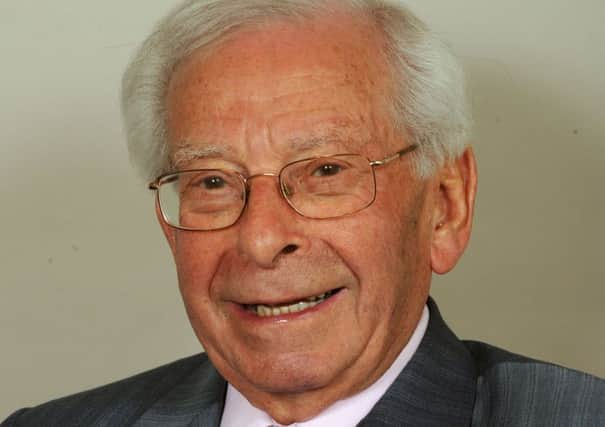Obituary: Baron Barnett, politician


Lord Barnett, formerly Joel Barnett, was the architect of the Labour government’s so-called “Barnett Formula” of 1978, which altered the portions of UK taxpayers’ money among England, Scotland, Wales and Northern Ireland. One of its raisons d’etre was to head off growing demands for Scottish devolution at that time by giving Scotland a bigger slice of the pie. During this year’s independence debate, however, he disavowed his own plan, said it had been a makeshift, short-term “national embarrassment, written on the back of an envelope” for political purposes and had unfairly benefitted Scotland over England by “wildly overestimating Scotland’s population”. At the time he drew up the plan, he was Chief Secretary to the Treasury in James Callaghan’s cabinet.
Although he was a strong believer in a United Kingdom, he said before the independence referendum that one benefit of a Yes vote would be that his formula would be dumped in the dustbin of history.
Advertisement
Hide AdAdvertisement
Hide AdAs things turned out after the referendum, his formula returned to centre stage in UK politics as the UK’s major party leaders said it would be a central plank in their “Devo-Max” settlement for Scotland.
Alistair Darling, leader of the No campaign and a former Chancellor of the Exchequer, said the Barnett Formula was still the best show in town. It is likely to be a major political issue in the run-up to next year’s general election.
In an interview with the Daily Telegraph at the time of the referendum, Lord Barnett said: “Scotland gets £1,600 more per head than England in public expenditure. That means they have been able to do things that we can’t, like prescription charges and university fees. That’s not fair on English taxpayers.
“We (the Labour Party) do have a major, major problem with Scotland. If we don’t get Scotland in the next general election, we’ll have a job getting a majority in the Commons. But the best Scottish Labour politicians have always moved down to Westminster to become MPs and the Labour leaders left in Scotland have been very poor … very complacent.
“They know that if they allow the replacement of the Barnett Formula, Scotland will lose a lot of money. Why would they agree to that?”
Joel Barnett was born opposite Strangeways prison in Manchester on 14 October, 1923 to Jewish tailor Louis Barnett and his wife Ettie.
He went to a Jewish primary school before winning a scholarship to Manchester Central High School but left at 14 to help earn money for the family. He did national service during the Second World War, after which he began his career as an accountant, eventually setting up his own practice. He married Lilian Goldstone in 1949.
He served as a councillor for Prestwich Borough in Bury, Greater Manchester, from 1956-59 and as treasurer of the Manchester branch of the Fabian Society, which seeks to advance the principles of socialism. After running unsuccessfully as Labour candidate for Runcorn in 1964, he was elected MP for Heywood and Royton, Greater Manchester, in 1964.
Advertisement
Hide AdAdvertisement
Hide AdHe was first appointed as Chief Secretary to the Treasury under Prime Minister Harold Wilson in 1974, the post included in the cabinet after 1977.
He continued under Prime Minister James Callaghan until 1979, when he was described as Chancellor Denis Healey’s right-hand man, drawing up his famous formula during that time. Such were Healey’s and Barnett’s reputations for being tight on public spending that colleagues dubbed the former Dr No and the latter Oddjob, after the famous James Bond villains.
Barnett chaired the Public Accounts Committee (PAC) of the House of Commons from 1979-83, having served on it for several years. MPs frequently came to him for his accounting expertise when filling in their expenses forms.
When his parliamentary seat was abolished by boundary changes in 1983, he was named a life peer as Baron Barnett of Heywood and Royton.
He once said that working in the Treasury gradually made him cynical as political considerations led to unhealthy short-term funding decisions.
Having started out as optimist about the UK economy, he ended up a pessimist, he said.
Although he was Labour through and through, Margaret Thatcher was an admirer of his record and became a friend. She is said to have offered him a post as a European Commissioner but eventually, in 1986, appointed him vice-chairman of the BBC board of governors, a post he held until 1993.
During his term, he saw Alasdair Milne resign as Director-General, replaced by Michael Checkland, himself an accountant. He later, in 1992, saw John Birt appointed.
Advertisement
Hide AdAdvertisement
Hide AdIn 1982, he published his memoirs, Inside the Treasury, spilling the beans on the Labour government’s relationship with the trade unions and their so-called social contract. “The only give and take in the social contract was that the government gave and the unions took,” he wrote.
He served on several company boards, chaired the Hansard Society and was a trustee of both the Open University Fund and the Victoria and Albert museum.
He was also a great supporter of Manchester’s Hallé Orchestra. During his term in the Lords, he served on the European Union Committee and the Economic Affairs Committee and had a spell on the influential Monetary Policy Committee of the Bank of England.
The Labour leader in the House of Lords, Baroness Royall of Blaisdon, said yesterday: “Joel was an extraordinary individual. As an MP, minister and colleague in the House of Lords, to the very end he was diligently holding the government to account and doing his best to ensure the best for the people of this country.”
Lord Barnett died at his home in Bury. He is survived by his daughter Erica.